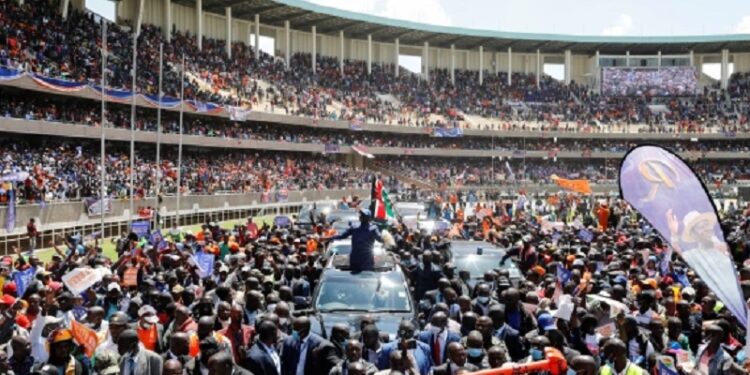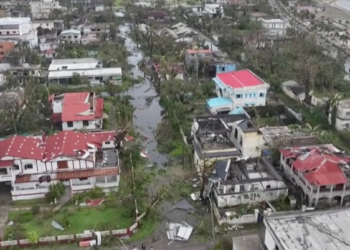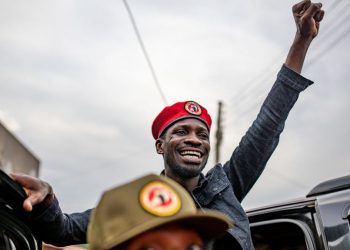The tribe factor has previously dominated Kenyan elections with the majority community, the Kikuyu having produced three out of four presidents so far. But for the first time, the Kikuyu community does not have a strong presidential candidate and the fifth president will not come from the populous tribe. Though tribal inclination still plays a key role in the August 9 elections, many Kenyans have found a common ground to base their presidential choice on issues that bedevil them.
The issue of gender parity, corruption, high cost of living, affordable quality education, debt, and joblessness top the key considerations by the voters and candidates alike. Some issues such as the high cost of living carry more weight than others such as corruption. Other factors include media influence and the impact the outgoing government will have on the general elections.
Out of the four presidential candidates, three have female running mates. Should any ticket with a female presidential candidate win, it will be historic to have the first female holding the second highest elective position in Kenya. It would be the beginning of addressing the enormous issue of gender parity. Although progress has been made like the appointment of the first female chief justice, a lot is yet to be done including achieving the two-third gender rule.
Cost of living
Many Kenyans are united on the high cost of living. I do not envy the incoming leadership as they will have a full plate-not with food, but urgent issues to solve such as food insecurity. The most basic thing to do is, to begin with, the basics! The basic thing to do is to make life affordable for citizens.
Although the country will take some time to recover from economic shocks, low-hanging fruits such as completing stalled dam projects and reviving the Galana-Kulalu project. The incoming administration should borrow good ideas from the outgoing Jubilee administration such as building one industry in each of the 47 counties to create more jobs and contribute to the growth of GDP.
Legalizing marijuana for commercial purposes
Professor Wajackoya inspired hope with practical solutions to pay off Kenya’s debt and empower citizens economically. Although the Roots party presidential candidate is not a front runner in this election, there have been calls to adopt his ideas by whoever wins. Legalizing marijuana for commercial purposes is a sure way to increase Kenya’s foreign exchange and also create more jobs.
However, proper controls like gazettement of regions to grow the bhang and putting measures to prevent abuse would go a long way toward its success. Failure to control the farming of marijuana would result in its abuse. Bhang smokers would take advantage and smoke it left, right, and centre.
Make higher education affordable
Benjamin Franklin once opined that an investment in knowledge pays the best interest. Justina Wamae, the running mate to Professor Wajackoya, in a televised debate pointed out that we have rich idiots and poor graduates and education is not the key anymore. Students are struggling to pay HELB loans and the government is not helping either. The National Treasury allocated $793 million to universities for the financial year beginning July 2022. The amount represents a 20% cut from the previous year.
The incoming government must make higher education affordable to learners. Help loans can be given as a grant to students. On the other hand, the government must create a conducive business environment and encourage entrepreneurship for graduates to make use of their skills. Incoming lawmakers should pass legislation and policies that ensure graduates have technical skills and can gain meaningful employment soon after leaving school-for those who choose to be employed.
Empower citizens economically: reduce corruption
Corruption in Kenya, like many African countries, and other nations across the world, seems to be a ‘nice-to-have.’ Every political season is characterized by handouts. ‘Give us something now before you go to loot once elected,’ seems to be a demand by voters every electioneering period. Voters receive political bribes of Kshs. 200, 300, 1,000, and sometimes even Kshs. 50, and ‘auction’ their votes to the highest bidder. If you have no money to ‘grease the hands of the voters so that they can remember your name at the polling station, woe unto you!
The media, electoral body, and all stakeholders need to empower citizens with information so that they can vote based on issues rather than how much they received from political candidates. For this to be effective, the government must empower citizens economically so that politicians who thrive on ‘politics of poverty’ find a rough time to get a following. If the status quo persists, eliminating corruption during the election period and in various sectors will be a cold day hell.
Healthcare
I would be remiss if I do not mention healthcare. The Kenya Kwanza coalition, led by Dr. Ruto has a good plan of accommodating everyone into the National Health Insurance Fund (NHIF), whereby those who earn more would contribute more money while those who earn low income would contribute lesser amounts and those who cannot afford to pay would be paid for by the government. On the other hand, Azimio la Umoja coalition, led by Raila Odinga proposes ‘baba care.’ I suppose the Roots party already has a health plan through medicinal marijuana that would uproot and alleviate all our pains and suffering!
Who will carry the day?
In less than two weeks, Kenyans will go to the polls to elect a Member of the County Assembly, a Member of Parliament, a Senator, a woman representative, and a president. If Professor Wajackoya becomes the next president, many might officially become ‘ganja farmers. If Dr. Ruto wins, maybe those at the bottom of the pyramid will have a field day. A win for Raila would finally give a man who has sought to be president since 1997 a chance to prove himself to Kenyans. And if Mr. Mwaure Waihiga wins, then for the first time, a member of the clergy will have won.
In conclusion
The 9th of August election is personal and emotional to the voter. Although some voters will vote based on a logical assessment of what each candidate promises to deliver, the emotional aspect will take centre stage. “What is in it for me? Will my vote count for an improved economy, better and affordable healthcare, good jobs for the unemployed -issues that are personal and dear to the voter?” Let’s discuss and vote on issues not which community a candidate hails from.
ــــــــــــــــــ
This article expresses the views and opinions of the author, and does not necessarily reflect the views of Qiraat Africa and its editors.



























































